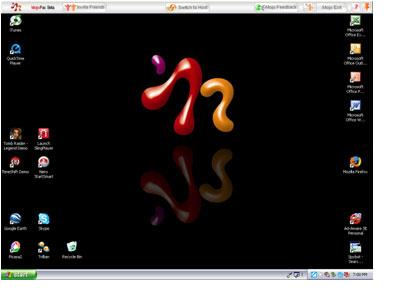"Freemium", Server Based Computing, and “TANSTAAFL”
TANSTAAFL is the acronym for "there ain't no such thing as a free lunch." A book by the same name was included on the mandatory reading list for my Economics 101 class. “Freemium” is the concatenation of “Free” and “Premium”. The basic service is free with extensions, add ons or ancillary products available with a “Premium” fee. “Freemium” as an economic concept does not break new ground. Someone is going to pay.
The good news is sometimes that someone will be someone else. If all you need is what the service/product provider is offering for free, then FREE is good. Googles' word processor and spreadsheet is an example. They have a minimum tool set, but for some users these applications meet all of their requirements. For others, maybe not all of their requirements are meet, but with a price of “Free”, the applications are good enough!
So who pays? Those that want more than what is offered for free. The threshold for willingness to pay for additional products/services is lower for premium add ons in this model because the basic product/service is known to work as “Free”. How many of us have paid “Premium” for a product that did not, when delivered, provide even the basics that it advertised?
Adobe Reader may be another example. The reader is free, but the writer/creator application is available for a fee. The web site counter, Active Meter, at the bottom of the left column in this blog is free. Works good and is all I need. If I need more, the company can provide additional services.
There is also another side to “Freemium” that I have not seen mentioned. “Freemium” denies revenue to other enterprises that charge for a similar service or product. Revenue and its cousin “Profit” are the agents that sustain and grow an enterprise. Reduced revenue to the enterprise will eventually translate to into a reduced ability to sustain currently operating procedures. Denied revenue for a product/service that was heretofore a source of fuel to drive the enterprises, they must adapt to remain competitive.
Server Based Computing has the equivalent of Google Docs and Adobe Reader with Edubuntu 6.10. Edubuntu is the education product member of Canonicals' suite including Ubuntu, Kubuntu, Xubuntu, and Edubuntu.
Downloaded the latest release Edubuntu 6.10 (install version) to see just how far the product has come over the past year. Without additional configuration other then the basic install, “it just worked”! After the installation was complete, I pressed the start button on my thin client (Devon IT NTA 6020A) and it PXE booted into the Edubuntu Server. Just to make sure it was really this easy I went over to the server and launched the Student Control Panel. There I was, listed as a student with my session “Curriculum Vitae”. Could not resist sending myself a message to the student session “hello brave new world”. And not a command line in sight.
Until the next post
Steve
The good news is sometimes that someone will be someone else. If all you need is what the service/product provider is offering for free, then FREE is good. Googles' word processor and spreadsheet is an example. They have a minimum tool set, but for some users these applications meet all of their requirements. For others, maybe not all of their requirements are meet, but with a price of “Free”, the applications are good enough!
So who pays? Those that want more than what is offered for free. The threshold for willingness to pay for additional products/services is lower for premium add ons in this model because the basic product/service is known to work as “Free”. How many of us have paid “Premium” for a product that did not, when delivered, provide even the basics that it advertised?
Adobe Reader may be another example. The reader is free, but the writer/creator application is available for a fee. The web site counter, Active Meter, at the bottom of the left column in this blog is free. Works good and is all I need. If I need more, the company can provide additional services.
There is also another side to “Freemium” that I have not seen mentioned. “Freemium” denies revenue to other enterprises that charge for a similar service or product. Revenue and its cousin “Profit” are the agents that sustain and grow an enterprise. Reduced revenue to the enterprise will eventually translate to into a reduced ability to sustain currently operating procedures. Denied revenue for a product/service that was heretofore a source of fuel to drive the enterprises, they must adapt to remain competitive.
Server Based Computing has the equivalent of Google Docs and Adobe Reader with Edubuntu 6.10. Edubuntu is the education product member of Canonicals' suite including Ubuntu, Kubuntu, Xubuntu, and Edubuntu.
Downloaded the latest release Edubuntu 6.10 (install version) to see just how far the product has come over the past year. Without additional configuration other then the basic install, “it just worked”! After the installation was complete, I pressed the start button on my thin client (Devon IT NTA 6020A) and it PXE booted into the Edubuntu Server. Just to make sure it was really this easy I went over to the server and launched the Student Control Panel. There I was, listed as a student with my session “Curriculum Vitae”. Could not resist sending myself a message to the student session “hello brave new world”. And not a command line in sight.
Until the next post
Steve



